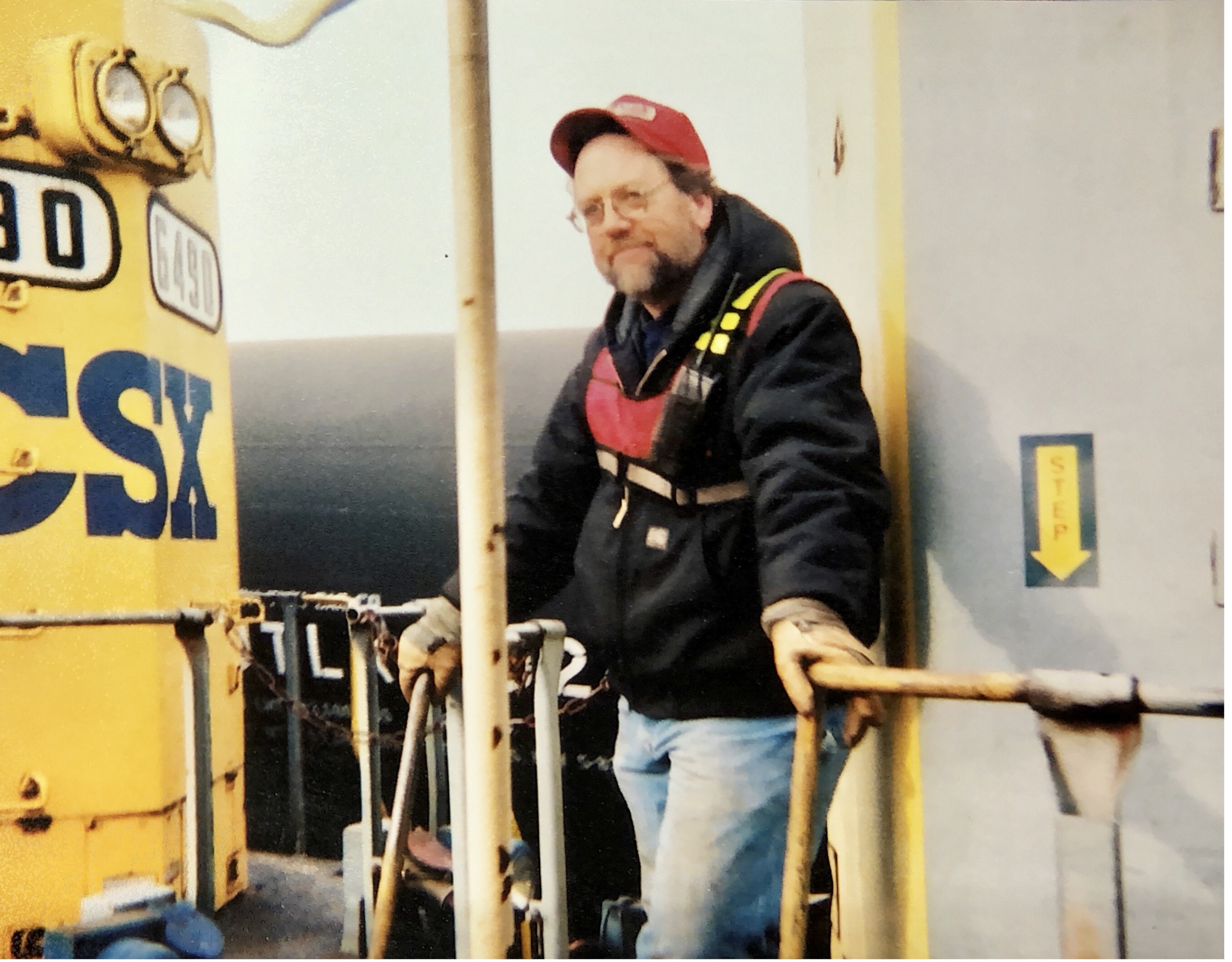Mike Emswiler of Pickerington was the engineer on a train that hit and killed a man last year. Emswiler now uses medical marijuana to help him deal with post-traumatic stress disorder. Behind him is wife Lisa, who also sought counseling after the second incident. Doral Chenoweth III | Columbus Dispatch
Former train engineer haunted by suicides
During his 33-year career as a train engineer, Mike Emswiler witnessed two pedestrian fatalities that were considered suicides. He is haunted by their deaths and has no desire to operate a locomotive again.
Mike Emswiler and his conductor chewed the fat as they wiled away the hours of a train trip across the Midwest, hauling empty coal cars.
The locomotive was pulling 110 cars at 36 mph as it rolled through Lawrence, Indiana.
“We were having a great trip that day,” said Emswiler, who as the engineer was responsible for operating the locomotive. “I mean, it couldn’t have been a better trip.”
As they reached the northeast edge of downtown Indianapolis, the conductor let out a yell. Emswiler’s attention snapped to the windshield in time to see a man, who had jumped from behind nearby bushes, throw himself in front of the moving train.
That was June 5, 2018, and though it happened in a flash, it’s the fleeting image of fatal impact, that flicker of a moment, that Emswiler can’t get out of his head.
It keeps him up at night. It left him angry, isolated and plagued by occasional flashbacks. More than a year and a half later, the 59-year-old Pickerington man has never boarded another train as he battles the demons of post-traumatic stress disorder.
“It’s like living in a shadow,” he said. “You don’t realize how major an organ your brain is in your body, and when it’s screwed up, it’s a mess.”
For those who make a living on the railroad, this is a career hazard. The Federal Railroad Administration reported 262 fatalities due to collisions in its preliminary statistics for 2018. Emswiler said that when he took the job, his company told him that it was more than likely that he would experience at least one pedestrian fatality firsthand.
As it turned out, he experienced two during his 33-year career with CSX, a national railroad company with a big presence in Columbus. The first happened in 2009, when his locomotive hit and killed a man walking along the track in the dead of night on Kinnear Road on the Northwest Side.
He was able to overcome that trauma and return to work, but the more recent incident proved too much to bear.
“I’ve been in a lot of traumatic situations on the railroad,” Emswiler said. “But that was the worst.”
No one has seen Emswiler’s personality change more poignantly than his wife of 12 years, Lisa.
“He’s never been an angry person,” Lisa said. “He has a real soft heart.”
Now? That side is still there, but another has crept in. There are the blank stares, the quick temper, the emotional distance.
“It’s this …” Lisa said, pausing as she struggled to find the right word — “blackness.”
There was nothing that Emswiler could have done to save the man’s life, but he did what he could at the time, activating the train’s emergency brakes and stopping the 400,000-pound vehicle in about 1,000 feet — roughly the length of three football fields. (It would have taken up to a mile to stop if the train had been hauling any coal.) Then he and the conductor radioed the railroad dispatcher to halt other train traffic, and they called 911.
“They were both looking for a way out, and all we did is help them. It still feels like you killed them, even if you didn’t.”
Emswiler never laid eyes on the body — identified in a Lawrence police report as a 44-year-old man — but he said his conductor found what remained 15 train cars back.
So much troubled him about what had happened, and it only added to his guilt that, as a diabetic, he had to eat something in the aftermath as he waited for the coroner to arrive.
“I had a guy laying dead underneath my train, but my sugar was getting low, so I had to eat.”
And although he was “a nervous wreck,” Emswiler said, his railroad company ordered him and the conductor to complete the route to Avon, Indiana, by traveling 20 more miles after police had cleared the scene.
Emswiler returned to work five days later, on June 10, only to be fired after an altercation with his boss. The next day, he sought counseling and was diagnosed with PTSD. He said the railroad union was able to negotiate on his behalf for him to retire with disability payments.
CSX did not respond to inquiries about this case and its policies for handling fatalities involving trains.
Mike Emswiler on the job in Newark in 2004. Mike Emswiler | Submitted photo
For Emswiler, the 2018 incident marked the end of a childhood dream. He had always loved trains, and for years, he enjoyed his job. The money and benefits were good, and what could beat spending every day watching the world whiz by from a train cab?
These days, though, he remains haunted by the question of why. Emswiler sought information about the victims in both collisions from the responding police departments.
He learned that the 2009 incident involved a man with bipolar disorder — information that came from the man’s mother when she called the railroad company to apologize. No details were available about the person who died in 2018.
With therapy and proper medication, Emswiler is beginning to heal, although setbacks happen, he said.
“Medical marijuana helps,” he said.
Subscribe to The Columbus Dispatch.
Still, Emswiler no longer looks at trains with the reverence of his youth.
He has no desire to operate a locomotive again. And he has no intention of returning to either spot where the suicides occurred.
Emswiler said he simply hopes people contemplating suicide seek the help they need before making a choice that reverberates far beyond their own lives.
“They were both looking for a way out, and all we did is help them,” he said. “It still feels like you killed them, even if you didn’t.”
Anyone having thoughts of suicide can get help by calling the National Suicide Prevention Lifeline at 800-273-8255 (or 1-888-628-9454 for Spanish speakers); the Franklin County Suicide Prevention Hotline at 614-221-5445; text 4HOPE to 741741 to reach someone at Ohio’s 24/7 Crisis Text Line; or reach Ohio State’s counseling center at 614-292-5766 during regular business hours, and at that number by pressing “Option 2” after hours.

